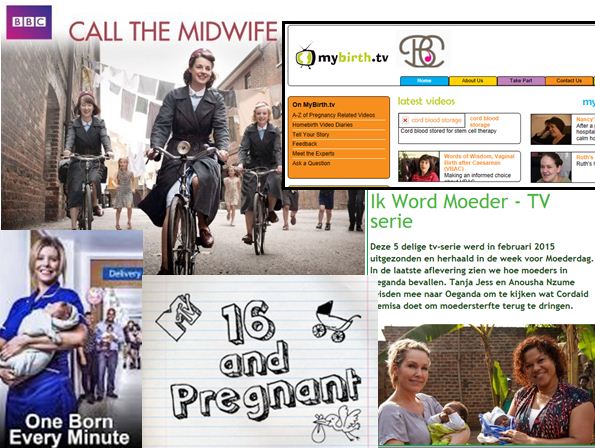
Today saw the publication “Is it realistic?” the portrayal of pregnancy and childbirth in the media, a paper which is truly interdisciplinary, both in terms of its authorship as well as its topics[1]. The lead-author, Dr. Ann Luce is based in the Faculty of Media & Communication, whilst her BU co-authors Dr. Catherine Angell, Prof. Vanora Hundley, Prof. Edwin van Teijlingen and Dr. Marylin Cash are all associated with the Faculty of Health & Social Sciences. Prof. Helen Cheyne, the only non-BU co-author, is based at the University of Stirling.
The paper is a scoping review to assess the influence media have on pregnant women. Much of the academic literature discusses the influence of (reality) television, which often portrays birth as risky, dramatic and painful. Although many claim that the portrayal of childbirth has a negative effect on society, there is little research evidence to support this claim. It has been suggested that women seek out such programmes to help understand what could happen during the birth because there is a cultural void through the increasing anticipation of negative outcomes. However the impact that has on normal birth has not been explored. Our paper highlighted three key themes: (a) the medicalisation of childbirth; (b) women using media to learn about childbirth; and (c) birth as a missing everyday life event. The key conclusions are the media appear to influence how women engage with childbirth. The dramatic television portrayal of birth may perpetuate the medicalisation of childbirth, and last, but not least, portrayals of normal birth are often missing in the popular media. Hence midwives need to engage with television producers to improve the representation of midwifery and maternity in the media.
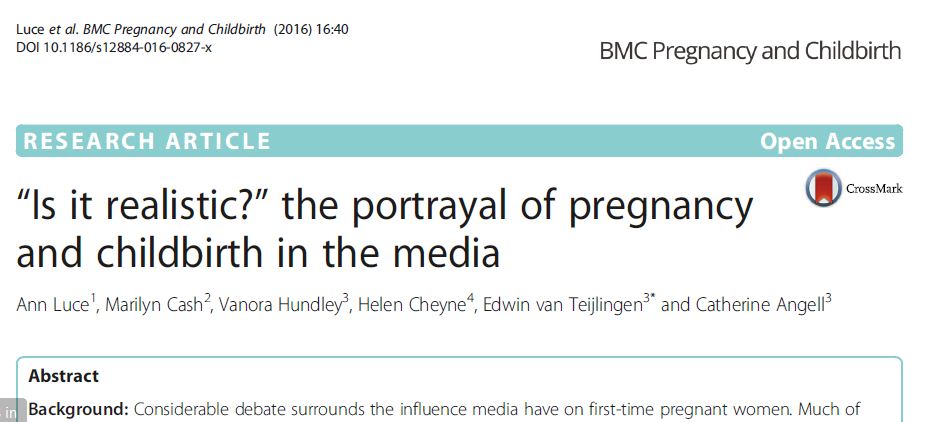
BMC Pregnancy and Childbirth is an Open Access journal so our paper is freely available to researchers, journalists, childbirth activists as well as pregnant women anywhere in the world. This paper builds on a growing number of academic papers published by staff in the Centre for Midwifery, Maternal & Perinatal Health (CMMPH) on the role the media play in health and midwifery, both in the UK [2-3] and in Nepal [4-6].
Prof. Edwin van Teijlingen
CMMPH
References:
- Luce, A., Cash, M., Hundley, V., Cheyne, H., van Teijlingen, E., Angell, C., (2016) “Is it realistic?” the portrayal of pregnancy and childbirth in the media BMC Pregnancy & Childbirth 16: 40
- Hundley, V., Duff, E., Dewberry, J., Luce, A., van Teijlingen, E. (2014) Fear in childbirth: are the media responsible? MIDIRS Midwifery Digest 24(4): 444-447.
- Hundley, V., Luce, A., van Teijlingen, E. (2015) Do midwives need to be more media savvy? MIDIRS Midwifery Digest 25(1):5-10.
- Devkota, S., Simkhada, P., van Teijlingen, E., Rai, L.D. (2012) Media use for Health Promotion: Communicating Childhood Immunisation Messages to Parents. Journal of Health Promotion 4(1): 1-9.
- Devkota, S., Simkhada, P., van Teijlingen, E., Rai, L.D. (2013) Childhood Immunisation in Nepal: Parents’ knowledge, attitudes and behaviour & implications for Health Policy. Health Science Journal 7(4):370-383.
- Devkota, S., Maharjan, H.M., van Teijlingen, E. (2015) Media and Health. In: Wasti, S.P., Simkhada, P.P. & van Teijlingen, E. (Eds.) The Dynamics of Health in Nepal, Kathmandu, Nepal: Social Science Baha & Himal Books: 169-184.
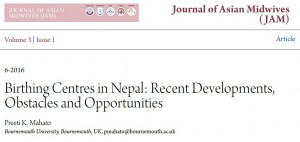 Congratulations to Preeti Mahato in the Centre for Midwifery, Maternal & Perinatal Health (CMMPH) on the publication of a paper based on her Ph.D. research. Her paper ‘Birthing centres in Nepal: Recent developments, obstacles and opportunities’ can be found in the June 2016 edition of the Journal of Asian Midwives (JAM) [1]. All articles in JAM are Open Access to ensure midwives and researchers in the poorest parts of Asia can freely access the scientific articles in the journal.
Congratulations to Preeti Mahato in the Centre for Midwifery, Maternal & Perinatal Health (CMMPH) on the publication of a paper based on her Ph.D. research. Her paper ‘Birthing centres in Nepal: Recent developments, obstacles and opportunities’ can be found in the June 2016 edition of the Journal of Asian Midwives (JAM) [1]. All articles in JAM are Open Access to ensure midwives and researchers in the poorest parts of Asia can freely access the scientific articles in the journal.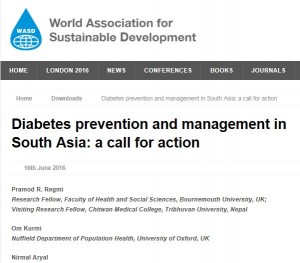
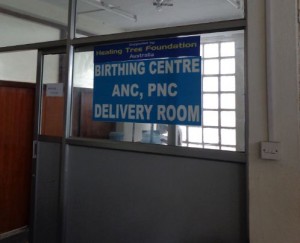

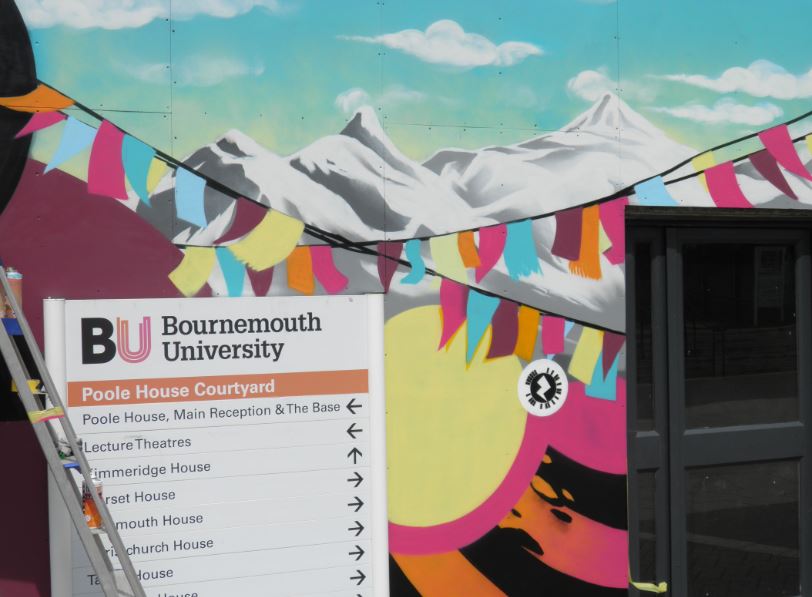
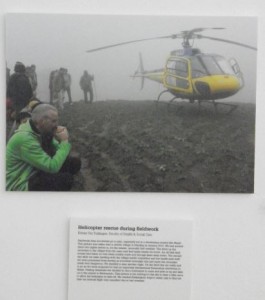
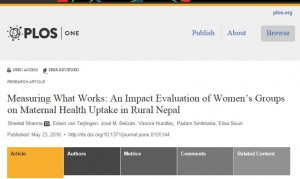
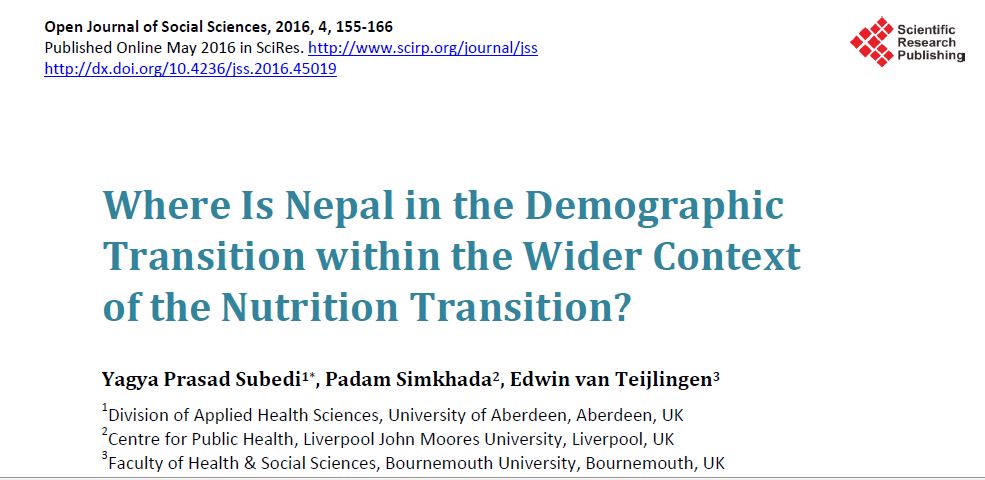
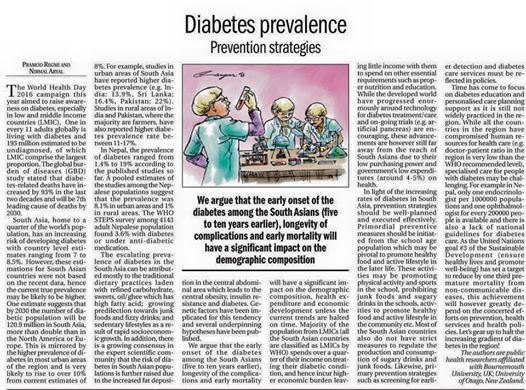

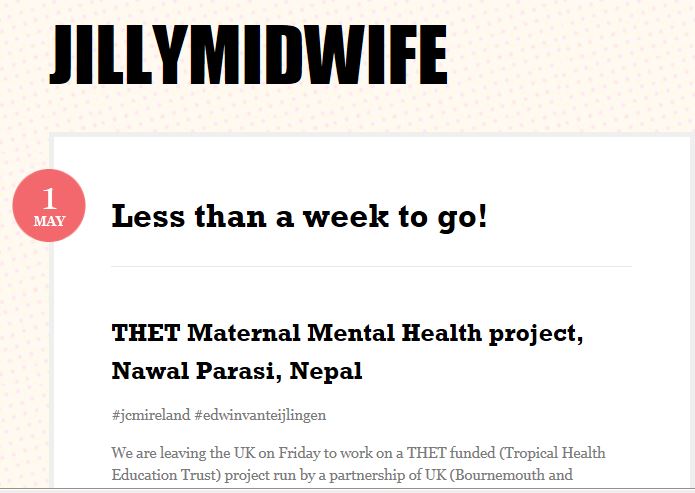
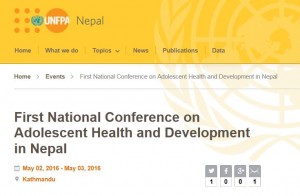

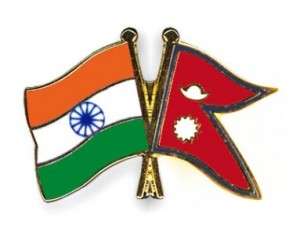
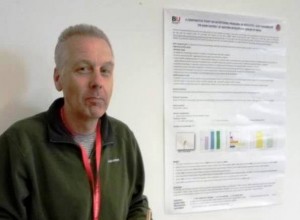
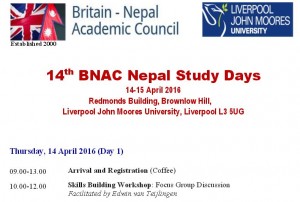
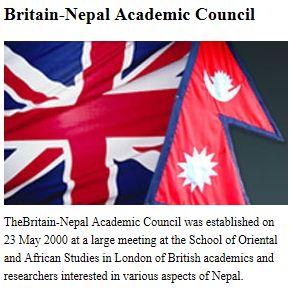
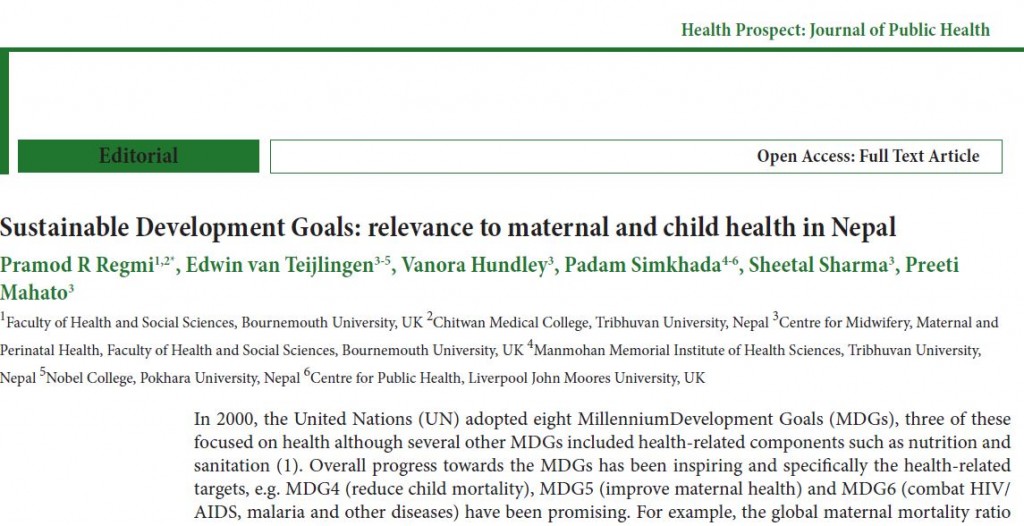
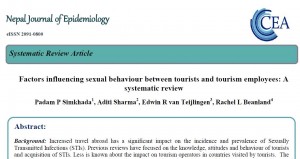
 Since his arrival in the Faculty of Health & Social Sciences last year postdoctoral researcher Dr. Pramod Regmi has been busy getting his publications out. Yesterday saw the latest of his articles appear in print, this time in the latest issue of the Nepal Journal of Epidemiology. The editorial, co-authored with Dr. Om Kurmi (University of Oxford) and Dr. Puspa R. Pant at the University of the West of England, addresses the growing problem air pollution in low-income countries such as Nepal. The paper is called: ‘
Since his arrival in the Faculty of Health & Social Sciences last year postdoctoral researcher Dr. Pramod Regmi has been busy getting his publications out. Yesterday saw the latest of his articles appear in print, this time in the latest issue of the Nepal Journal of Epidemiology. The editorial, co-authored with Dr. Om Kurmi (University of Oxford) and Dr. Puspa R. Pant at the University of the West of England, addresses the growing problem air pollution in low-income countries such as Nepal. The paper is called: ‘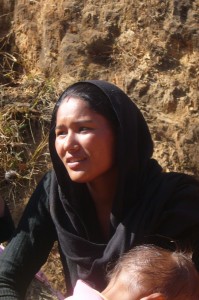
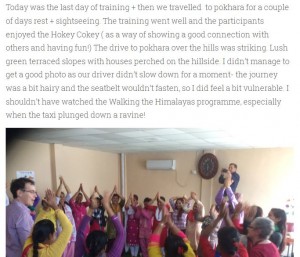
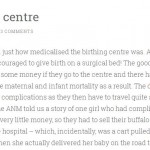














 REF Code of Practice consultation is open!
REF Code of Practice consultation is open! BU Leads AI-Driven Work Package in EU Horizon SUSHEAS Project
BU Leads AI-Driven Work Package in EU Horizon SUSHEAS Project Evidence Synthesis Centre open at Kathmandu University
Evidence Synthesis Centre open at Kathmandu University Expand Your Impact: Collaboration and Networking Workshops for Researchers
Expand Your Impact: Collaboration and Networking Workshops for Researchers ECR Funding Open Call: Research Culture & Community Grant – Apply now
ECR Funding Open Call: Research Culture & Community Grant – Apply now ECR Funding Open Call: Research Culture & Community Grant – Application Deadline Friday 12 December
ECR Funding Open Call: Research Culture & Community Grant – Application Deadline Friday 12 December MSCA Postdoctoral Fellowships 2025 Call
MSCA Postdoctoral Fellowships 2025 Call ERC Advanced Grant 2025 Webinar
ERC Advanced Grant 2025 Webinar Update on UKRO services
Update on UKRO services European research project exploring use of ‘virtual twins’ to better manage metabolic associated fatty liver disease
European research project exploring use of ‘virtual twins’ to better manage metabolic associated fatty liver disease